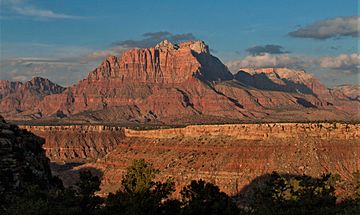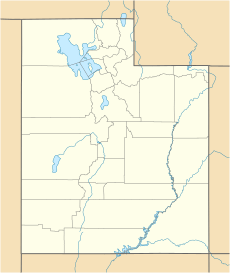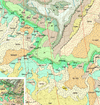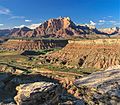Mount Kinesava facts for kids
Quick facts for kids Mount Kinesava |
|
|---|---|

Mount Kinesava, southwest aspect
|
|
| Highest point | |
| Elevation | 7,285 ft (2,220 m) |
| Prominence | 685 ft (209 m) |
| Isolation | 1.06 mi (1.71 km) |
| Parent peak | The West Temple (7,810 ft) |
| Geography | |
| Location | Zion National Park Washington County, Utah United States |
| Parent range | Markagunt Plateau Colorado Plateau |
| Topo map | USGS Springdale West |
| Geology | |
| Age of rock | Jurassic |
| Type of rock | Navajo sandstone |
| Climbing | |
| Easiest route | class 4 scrambling |
Mount Kinesava is a tall mountain made of sandstone. It stands 7,285-foot (2,220 m) high in Zion National Park, located in southwest Utah, United States.
Contents
About Mount Kinesava
Mount Kinesava is right next to the town of Springdale. It rises about 3,400 feet (1,030 meters) above the town and the bottom of Zion Canyon. Rain and snowmelt from the mountain flow into small streams that eventually reach the Virgin River.
The mountain's name was officially chosen in 1934. It is named after Kinesava, a special spirit or deity known for being a trickster in the stories of the Paiute people.
Neighboring Peaks
Mount Kinesava has several impressive neighbors. The closest taller mountain is The West Temple, which is about 1.06 mi (1.71 km) to the northeast. Other mountains you can see from Mount Kinesava include The Watchman to the east-southeast and Bridge Mountain to the east-northeast. Mount Spry is also visible to the northeast.
Weather at Mount Kinesava
The best times to visit Mount Kinesava are during spring and fall. The area has a "cold semi-arid climate." This means that the coldest month usually has an average temperature below 32 °F (0 °C). Also, more than half of the year's rain and snow falls during spring and summer.
This desert climate does not get much rain, usually less than 10 inches (250 millimeters) each year. Snowfall in winter is generally light.
How Mount Kinesava Formed
Mount Kinesava is made of layers of sandstone. These layers formed from huge sand dunes that existed about 175 to 200 million years ago. You can see these layers clearly on the south side of the mountain.
The top 1,500 feet of the mountain are made of light-colored Jurassic Navajo Sandstone. Below this, you'll find deep-red sandstone from the Kayenta Formation. This layer is famous for dinosaur tracks found in other areas. Even lower are layers from the Moenave Formation. Near the very bottom, there's rock from the Chinle Formation, often surrounded by rocks that have slid down the mountain.
Gallery
 | Chris Smalls |
 | Fred Hampton |
 | Ralph Abernathy |













